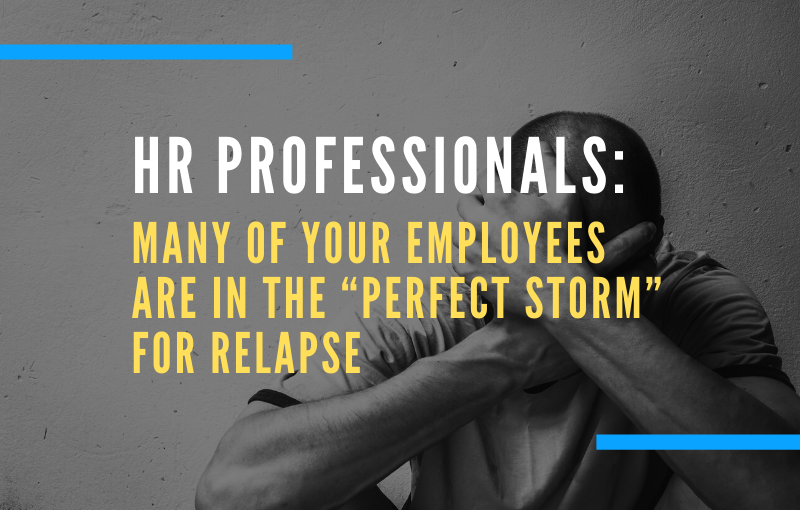HR Professionals: Many of Your Employees are in the “Perfect Storm” for Relapse
Like everyone else, HR professionals are learning to navigate this unprecedented time in the world right now. Adapting to this change may cause even greater stress on HR and employees alike. Especially for companies unfamiliar with flex work and those that don’t normally have employee work from home benefits.
Maintaining performance and accountability amid this newfound flexibility and freedom is already challenging. And, the stakes are even higher. With more than 33% of employees admitting they are more likely to drink alcohol during working hours while quarantined. HR professionals must find a way to get ahead of this issue before it becomes problematic.
Below are three steps HR professionals can use to navigate this unprecedented time and adapt for future guidelines once work in offices resumes:
Invest in Remote Work Training
According to HR Acuity, 43% of American workers work at least some of the time remotely. Companies today must provide training on how to be productive, manage expectations, set, and achieve KPIs. Plus, how to avoid common work-from-home pitfalls. For managers, this includes training on how to diagnose performance issues and hold employees accountable remotely.
Offering proactive guidance, education, and training provides employees at all levels with strategies that can help reduce the stress and uncertainty of the situation. This can help to stave off the development of any unhealthy habits, including drinking on the job. In addition, offer training to all managers and HR staff about substance use in the workplace so they feel prepared to provide the right kind of support in those difficult conversations.
Understand the Signs
When faced with adversity, many may look to alcohol to alleviate their stress as it numbs emotions. Particularly when confined to your home with less work to do than usual. It can also be tempting to grab a drink during the workday. With no physical contact, these signs are more difficult to spot. Especially for those with no experience managing remote employees or navigating the sensitivities around employees and addiction.
HR professionals can start by educating managers and company leadership on the signs of drinking during work hours, and the risks involved with increased alcohol consumption. Encourage managers and teams to use both phone and video conferencing to check in regularly, and perhaps more frequently than usual. At least several times a week.
If an employee routinely looks tired, lacks engagement, repeatedly refuses to use the video function, displays slurred speech, or is often tardy. It’s time to bring the issue to the attention of HR.
Reinforce Your Open-Door Policy
While it cannot be an employee requirement to self-report addiction or substance use disorder, it’s extremely valuable to create an environment in which they feel comfortable to do so. A great example of this is in some organizations. If an employee self-reports a relapse, leadership takes action to make sure they get the treatment and support they need to get back on track. However, if it is found that the employee is using, it can be grounds for termination. That’s a critical distinction.
Approaching the situation from a non-threatening, non-judgmental perspective, creates a context in which employees know they can get help. Rather than hiding in secret.
For the 1 in 10 Americans that struggle with addiction, the pressures of isolation, stress, and fear amid this pandemic is a recipe for relapse. It is crucial to keep lines of communication open. HR professionals should empower employees to ask for help and reach out to a mentor or HR if they’re struggling.
Now is the perfect time to reinforce education around the risks of alcohol use in the remote workplace.
Authors
Tim Stein
Tim Stein is the VP of Human Capital at American Addiction Centers, the leading provider for addiction treatment nationwide, specializing in evidence-based treatment and mental health care. He is in recovery. If you or someone you know is struggling with alcohol addiction, visit https://www.alcohol.org/.
Recruit Smarter
Weekly news and industry insights delivered straight to your inbox.





